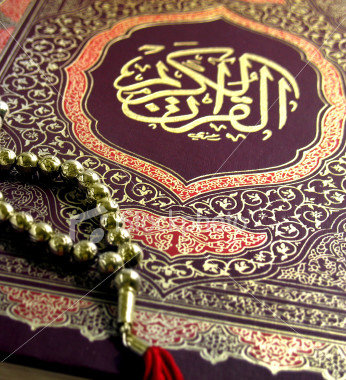Posts Tagged ‘Mohd’
How should a husband treat his wife?
Posted on: May 26, 2010
- In: All | Allah الله | Islam | Women In Islam
- 3 Comments

How should a husband treat his wife?
Look how Islam values women and how an Islam scholars perspective of women was back in 18th century, way before the womens basic rights were accepted around in the other countries of the world.
” Oh my friend, You have to be gentle, understanding and friendly to your wife. you have to talk with her in a polite and soft way and sweetness of words.
Our beloved Prophet[pbuh] said: The best of people is the one who is beneficial and helpful to his wife and his house members”.
when you found her sad and worried, you need to say you love her and you need to cheer her up with compassion as she might feeling depressed or hopeless at that time at home. You should be her best friend, her support in her troubles.
You should help her with the education of the children. The children will not give her a break and rest as they whine, cry, and ask for things day and night. If you help her, her Lord Allah will help you too.
About the mistakes she did, you must not get angry or say rude words. Even when you have to give her silent treatment, you should cut it after one day. when you discover a bad habit of hers or a behavior you did not like about her, you should find the fault in you and say:
“if I was a better person and had better behavior, she would be nicer, too”.
When she gets angry, you have to be silent. When you do not respond her, she would regret and apologize to you.
When she is helping, supporting and serving you, you should pray for her and you should thank and praise Allah since your wife, who is a good match for you, is a bounty by God that could never be thanked enough for.
You have to treat your wife in a way that she needs to think “my husband loves me more than anyone.”
About the household and financial issues, you have to consult her and talk together. You should not bother your wife with your other big troubles and issues. You need to ignore her bad behaviors unless they are forbidden by Allah, that is, unless she is committing a sin.
You have to hide her secret faults and her private matters from everybody. You should make compliments , appropriate jokes, and create entartainment for your wife.
Our beloved Prophet Muhammad[pbuh] would compliment, mingle and make jokes with his wife. He was the ultimate gentlemen and the most refined elegant person towards his wife. Once he had a race with his wife and his wife won, in the second time, he won.
Mild and pleasant conversations will bond you with your wife. You need to read each other about the basics and pillars of Islam, and other the necessary knowledge and sicences. You have to provide for her whatever you have for yourself in terms of clothing, food, and so on.
You should not reflect your troubles, problems, your sadness, enemies and your debts to her becuase even if she overcome these problems, these troubles will leave marks in her soul and affects her inner peace.
You should always say heartful of good praying to her face and her behind not ever bad prayers since she is always there for you and serving you day and night. She prepares your bread, your meal, mend and wash your clothess. She is the protector and manager of your dignity, honor, your properties, and your children . She is your best friend, your only support as you are to her, she is your love as you are her love.“
got it bros……..?
so married bro go tell ur wife today that you love her …. 🙂
and unmarried bros….remember this small Article Advice….and do it when you have ur partner…!
🙂
JazakAllah khair for reading…..
King
slave of ALLAH SWT


 [post this Article on your facebook wall,and share with friends.click above “Share” button …]
[post this Article on your facebook wall,and share with friends.click above “Share” button …]


[where ever you post,please add source link.either in website or even in facebook NOTE…please….spread the link of site..]

![]() Note:I’d love to see who visit my website,your views about website. Click here to leave your feedback.
Note:I’d love to see who visit my website,your views about website. Click here to leave your feedback.

How to make your Wife happy ?
Posted on: May 13, 2010
- In: All | Allah الله | Islam | Women In Islam
- 16 Comments

How to make your Wife happy ?

Beautiful Reception
After returning from work, school, travel, or whatever has separated you:
- Begin with a good greeting.
- Start with Assalamau ‘Aliaykum and a smile. Salam is a sunnah and a du’aa for her as well.
- Shake her hand and leave bad news for later!
Sweet Speech and Enchanting Invitations
- Choose words that are positive and avoid negative ones.
- Give her your attention when you speak of she speaks.
- Speak with clarity and repeat words if necessary until she understands.
- Call her with the nice names that she likes, e.g. my sweet-heart, honey, saaliha, etc.
Friendliness and Recreation
- Spend time talking together.
- Spread to her goods news.
- Remember your good memories together.
Games and Distractions
- Joking around & having a sense of humor.
- Playing and competing with each other in sports or whatever.
- Taking her to watch permissible (halal) types of entertainment.
- Avoiding prohibited (haram) things in your choices of entertainment.
Assistance in the Household
- Doing what you as an individual can/like to do that helps out, especially if she is sick or tired.
- The most important thing is making it obvious that he appreciates her hard work.
Consultation (Shurah)
- Specifically in family matters.
- Giving her the feeling that her opinion is important to you.
- Studying her opinion carefully.
- Be willing to change an opinion for hers if it is better.
- Thanking her for helping him with her opinions.
Visiting Others
- Choosing well raised people to build relations with. There is a great reward in visiting relatives and pious people. (Not in wasting time while visiting!)
- Pay attention to ensure Islamic manners during visits.
- Not forcing her to visit whom she does not feel comfortable with.
Conduct During Travel
- Offer a warm farewell and good advice.
- Ask her to pray for him.
- Ask pious relatives and friends to take care of the family in your absence.
- Give her enough money for what she might need.
- Try to stay in touch with her whether by phone, e-mail, letters, etc..
- Return as soon as possible.
- Bring her a gift!
- Avoid returning at an unexpected time or at night.
- Take her with you if possible.
Financial Support
- The husband needs to be generous within his financial capabilities. He should not be a miser with his money (nor wasteful).
- He gets rewards for all what he spends on her sustenance even for a small piece of bread that he feeds her by his hand (hadeith).
- He is strongly encouraged to give to her before she asks him.
Smelling Good and Physical Beautification
- Following the Sunnah in removing hair from the groin and underarms.
- Always being clean and neat.
- Put on perfume for her.
Intercourse
- It is obligatory to do it habitually if you have no excuse (sickness, etc.)
- Start with “Bismillah” and the authentic du’a.
- Enter into her in the proper place only (not the anus).
- Begin with foreplay including words of love.
- Continue until you have satisfied her desire.
- Relax and joke around afterwards.
- Avoid intercourse during the monthly period because it haram
- Do what you can to avoid damaging her level of Hiyaa (shyness and modesty) such as taking your clothes together instead of asking her to do it first while he is looking on.
- Avoid positions during intercourse that may harm her such as putting pressure on her chest and blocking her breath, especially if you are heavy.
- Choose suitable times for intercourse and be considerate as sometimes she maybe sick or exhausted.
Guarding Privacy
- Avoid disclosing private information such as bedroom secrets, her personal problems and other private matters.
Aiding in the Obedience to Allah
- Wake her up in the last third of the night to pray “Qiyam-ul-Layl” (extra prayer done at night with long sujood and ruku’ua).
- Teach her what you know of the Qur’an and its tafseer.
- Teach her “Dhikr” (ways to remember Allah by the example of the prophet) in the morning and evening.
- Encourage her to spend money for the sake of Allah such as in a charity sale.
- Take her to Hajj and Umrah when you can afford to do so.
Showing Respect for her Family and Friends
- Take her to visit her family and relatives, especially her parents.
- Invite them to visit her and welcome them.
- Give them presents on special occasions.
- Help them when needed with money, effort, etc..
- Keep good relations with her family after her death if she dies first. Also in this case the husband is encouraged to follow the sunnah and keep giving what she used to give in her life to her friends and family.
(Islamic) Training & Admonition
This includes:
- The basics of Islam
- Her duties and rights
- Reading and writing
- Encouraging her to attend lessons and halaqahs
- Islamic rules (ahkam) related to women
- Buying Islamic books and tapes for the home library
Admirable Jealousy
- Ensure she is wearing proper hijab before leaving house.
- Restrict free mixing with non-mahram men.
- Avoiding excess jealousy.
Examples of this are:
1- Analyzing every word and sentence she says and overloading her speech by meanings that she did not mean
2- Preventing her from going out of the house when the reasons are just.
3- Preventing her from answering the phone.
Patience and Mildness
- Problems are expected in every marriage so this is normal. What is wrong is excessive responses and magnifying problems until a marital breakdown.
- Anger should be shown when she exceeds the boundaries of Allah SWT, by delaying prayers, backbiting, watching prohibited scenes on TV, etc..
- Forgive the mistakes she does to you.
Correcting her Mistakes
- First, implicit and explicit advice several times.
- Then by turning your back to her in bed (displaying your feelings). Note that this does not include leaving the bedroom to another room, leaving the house to another place, or not talking with her.
- The last solution is lightly hitting (when allowable) her. In this case, the husband should consider the following:
He should know that sunnah is to avoid beating as the Prophet PBUH never beat a woman or a servant.
- He should do it only in extreme cases of disobedience, e.g. refusing intercourse without cause frequently, constantly not praying on time, leaving the house for long periods of time without permission nor refusing to tell him where she had been, etc..
- It should not be done except after having turned from her bed and discussing the matter with her as mentioned in Qur’an .
- He should not hit her hard injuring her, or hit her on her face or on sensitive parts of her body.
- He should avoid shaming her such as by hitting her with a shoe, etc.
Pardoning and Appropriate Censure
- Accounting her only for larger mistakes.
- Forgive mistakes done to him but account her for mistakes done in Allah’s rights, e.g. delaying prayers, etc..
- Remember all the good she does whenever she makes a mistake.
- Remember that all humans err so try to find excuses for her such as maybe she is tired, sad, having her monthly cycle or that her commitment to Islam is growing.
- Avoid attacking her for the bad cooking of the food as the Prophet PBUH never blamed any of his wives for this. If he likes the food, he eats and if he doesn’t then he does not eat and does not comment.
- Before declaring her to be in error, try other indirect approaches that are more subtle than direct accusations
- Escape from using insults and words that may hurt her feelings.
- When it becomes necessary to discuss a problem wait until you have privacy from others.
- Waiting until the anger has subsided a bit can help to keep a control on your words.
summary of the book “How to make your wife happy” by Sheikh Mohammed Abdelhaleem Hamed.


 [post this Article on your facebook wall,and share with friends.click above “Share” button …]
[post this Article on your facebook wall,and share with friends.click above “Share” button …]


[where ever you post,please add source link.either in website or even in facebook NOTE…please….spread the link of site..]

![]() Note:I’d love to see who visit my website,your views about website. Click here to leave your feedback.
Note:I’d love to see who visit my website,your views about website. Click here to leave your feedback.

- In: All | Allah الله | Hadith/Sunnah | Islam | Mohammad | muhammad | Prophet Muhammad [pbuh]
- 4 Comments
The Sunnah in Performing “Ablution”

1. Mentioning the name of Allah-In the Name of Allah, the Most Beneficent, the Most Merciful [saying: bismillah ar-Rahman ar-Rahim]
2. Washing the hands thrice.
3. [Starting by] Rinsing the mouth and nose before washing the face.
4. Rinsing the nose by one’s left hand. This is because it is mentioned in the hadith that the Prophet (peace and blessings be upon him), “washed his hands thrice, then he rinsed his mouth and washed his nose with water by putting water in it and blowing it out, and he washed his face thrice…) [Narrated by Bukhari and Muslim].
5. Exaggerating in rinsing one’s mouth and nose if not fasting by moving water around the mouth and snuffing water to the end of one’s nose. This is because of the hadith, “…and snuff with water well except when you are fasting”. [Sunan al-Tirmidhi, Abu Dawoud, ibn Maja and An-Nasa’i].
6. Rinsing one’s mouth and nose with the same handful of water. This is because of the hadith, “He [the Prophet] put his hand [into the vessel containing water] rinsed his mouth and his nose”. [Bukhari and Muslim].
7. Using tooth stick [Ar. Siwak] before rinsing one’s mouth. The Prophet (peace and blessings be upon him says, “Had I not thought it difficult for my Ummah, I would have commanded them to use the Siwak (tooth-stick) before every Prayer.”[Narrated by Ahmed and An-Nasa’i].
8. Running one’s wet finger through the beard upon washing the face. It is mentioned in the hadith that the Prophet (peace and blessings be upon him used to run his wet finger through his beard while performing ablution. [Al-Thirmithi].
9. Wiping over one’s head. This is performed as follows: passing one’s wet hands over the head from front to back and so forth. As for obligatory wiping over one’s head, it is to wipe over one’s head in any way. It is narrated that the Messenger of Allah used to pass his hands over his head [in ablution] from the front to the back. [Bukhari and Muslim].
10. Running wet fingers between the fingers and toes. The Prophet (peace and blessings be upon him) said, “Perform your ablution perfectly and let water to run between the fingers [and toes]”.
11. Washing the right [limb] before the left. It is narrated in the hadith that the Messenger of Allah (peace and blessings be upon him): “Used to start from the right side on wearing shoes, combing his hair, cleaning or washing himself and on doing anything else” [Bukhari and Muslim].
12. Performing the actions thrice when washing the face, hands and foot.
13. Saying the two testifications of faith [Ar.Shahadatan] after finishing ablution. Meaning, to says, “I testify that there is no god except Allah and that Muhammad is His Messenger”. It is narrated that the Prophet (peace and blessings be upon him) said, ” If anyone amongst you performs the ablution perfectly and then says: I testify that there is no god but Allah and that Muhammad is the servant of Allah and His Messenger, the eight gates of Paradise would be opened for him and he may enter by whichever of them he wishes”. [Muslim]
14. Performing ablution in one’s house. The Prophet (peace and blessings be upon him) said, “Whoever purifies in his house and walks to the mosque to perform obligatory prayer, his steps are counted as one expiates a sin and the other raises his rank” [Muslim]
15. Passing one’s hand over the limb while or after washing.
16. Using little amount of water. The Prophet (peace and blessings be upon him) used to use little amount of water in ablution. [Narrated by Bukhari and Muslim]
17. Washing above the limits of the four limbs [hands and foot]. It is narrated that Abu Huraira (may Allah be pleased with him) performed ablution, he washed his arm up to the elbows and his feet up to the ankles and said: this is how the Messenger of Allah (peace and blessings be upon him) performed ablution”. [Muslim]
18. Performing two rak’ahs [Eng. Units of prayer] after ablution. The Messenger of Allah (peace and blessings be upon him) said, ” He who performs ablution like this of mine and then stood up (for prayer) and offered two rak’ahs of prayer without allowing his thoughts to be distracted, all his previous sins are expiated” [Narrated by Bukhari and Muslim]
In a report by Muslim through ‘Uqba ibn ‘Amir: “He will be rewarded by nothing except Paradise”.
19. Perfecting one’s ablution: washing each part perfectly. Muslims vary in times of performing ablution during the day, and everyone has to observe these Sunan in every time he performs ablution.
Virtue of observing the above Sunan:
The Prophet (peace and blessings be upon him) said, “He who performed ablution perfectly, his sins would come out from his body, even coming out from under his nails.” [Muslim].
Dhul-Hijjah
Posted on: November 21, 2009
- In: All | Allah الله | Islam | Ramadaan
- 5 Comments
Dhul-Hijjah
The month known as Dhul-Hijjah. Our hearts and prayers are with those undertaking the difficult pilgrimage during these days. For those of us who are not performing the Hajj, there are still many ways to make the most of this blessed time!

Virtues of the first 10 Days of Dhul-Hijjah
How many times have we heard Surat Al-Fajr recited, be it in our homes, while memorizing, or in the mosque? As a shorter surah, it may be a frequent part of our prayers, but taking the time to reflect on even a part of the first verse reveals a treasure of meaning. In the first two ayahs (verses) of Surat Al-Fajr Allah says:
وَالْفَجْرِ وَلَيَالٍ عَشْرٍ
“By the dawn; And the ten nights…”
According to scholars of the Qur’an, the days mentioned as significant enough for Allah to swear by them are the first ten days of Dhul-Hijjah.
Describing how these ten days are among the best, the Prophet (peace and blessings of Allah be upon him) said:
“There are no days on which righteous deeds are more beloved to Allah than these ten days.” They said: “Not even jihad for the sake of Allah?” He said: “Not even jihad for the sake of Allah, unless a man goes out himself for jihad taking his wealth with him and does not come back with anything.” [Bukhari, 2/457]
The Prophet (peace be upon him) also said: “There is no deed that is better before Allah or more greatly rewarded than a good deed done in the (first) ten days of al-Adha.” He was asked: “Not even jihad for the sake of Allah?” He said: “Not even jihad for the sake of Allah, unless a man goes out himself for jihad taking his wealth with him and does not come back with anything.” [Al-Daarimi, 1/357]
Thus, the ten days are better than all other days of the year, with no exception, even the last ten days of Ramadan. (The last ten nights of Ramadan, however, are understood to be better than the nights of Dhul-Hijjah, because they include Laylat al-Qadr (the night of power), which is better than a thousand months [Qur’an, 97:3]).
Therefore, whoever is not able to go to Hajj should use this blessed time to complete even more righteous deeds than usual. These can include anything such as giving charity, honouring one’s parents, upholding the ties of kinship, and enjoining what is good and forbidding what is evil. Fasting and remembrance are particularly recommended:
1. Fasting Nine days, especially on the Day of ‘Arafah:
It is Sunnah for the Muslim to fast on the first nine days of Dhul-Hijjah, because fasting is one of the best of deeds. In a hadith qudsi, Allah says: “All the deeds of the son of Adam are for him, except fasting, which is for Me and I shall reward for it.” [Bukhari, 1805.]
The Prophet (peace be upon him) used to fast on the first nine days of Dhul-Hijjah. The Prophet (peace be upon him) said, “The Prophet used to fast on the first nine days of Dhul-Hijjah and the day of Ashura, and three days each month, the first Monday of the month and two Thursdays.” [Abu Dawood 2/462]
The ten days of Dhul-Hijjah include Yawm al-`Arafah (the Day of `Arafah), on which Allah perfected His Religion. The Prophet (peace be upon him) said:
“Fasting the day of `Arafah expiates the sins of two years: the past one and the coming one. And fasting the day of Ashura expiates the sins of the past year.” [Muslim]
2. Remembrance
It is Sunnah to recite remembrances known as the takbeer, tahmeed, tahleel, and tasbeeh during the first ten days of Dhul-Hijjah, saying these words out loud in the mosques, homes, streets and every place in which it is permissible to remember Allah:
* Takbeer: Allahu akbar (God is most great)
* Tahmeed: Al-hamdu Lillah (All praises be to God)
* Tahleel: Laa ilaha ill-Allah (There is no god but Allah)
* Tasbeeh: Subhaan-Allah (Glory be to God),
The Prophet (peace be upon him) explained how,
“There are no days that are greater before Allah or in which good deeds are more beloved to Him, than these ten days, so recite a great deal of tahleel, takbeer and tahmeed during them.” [Ahmad, 7/224]
While there are different versions, the takbeer can also be recited as follows:
Allahu akbar, Allahu akbar, laa ilaaha ill-Allah, Allahu akbar, wa Lillaah il-hamd.
Allah is Most Great, Allah is Most Great, there is no god but Allah; Allah is Most Great and to Allah be praise.










































 Oh Allah,Please Forgive me
Oh Allah,Please Forgive me Ex-Christians-Now Muslim,Alhamdulillah
Ex-Christians-Now Muslim,Alhamdulillah I Love My Prophet Muhammad s.a.w
I Love My Prophet Muhammad s.a.w
















![Fake Grave of Prophet Muhammad [pbuh]](https://islamgreatreligion.files.wordpress.com/2009/07/prophet_muhammad_pbuh_tomb4.jpg)


















Recent Comments